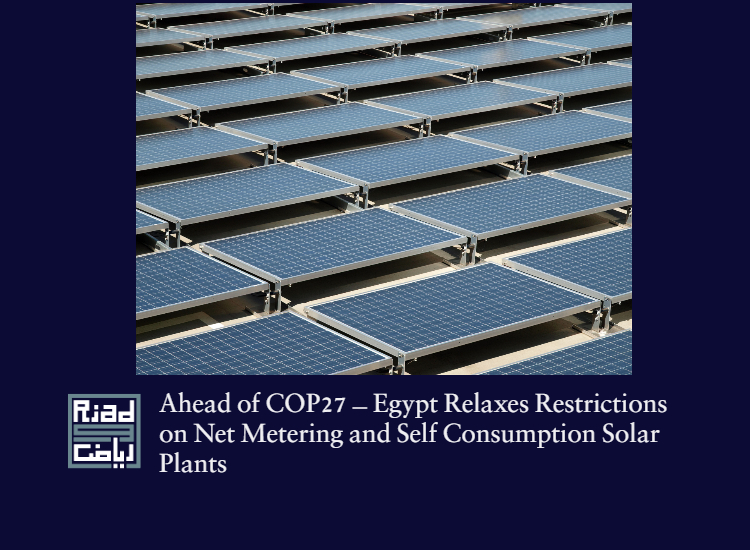
Ahead of COP27 – Egypt Relaxes the Restrictions on Net Metering and Self Consumption Solar Plants
The Egyptian Electric Utility & Consumer Protection Regulatory Agency (EgyptERA) issued Decree 6/2022 announcing new incentives aiming at encouraging more solar plants under (1) the net-metering system and (2) the self-consumption system connected to the grid (“Decree”).
The Decree comes ahead of the 27th United Nations Climate Change Conference (COP27) to be held in Sharm El-Sheikh. The government has plans to develop Sharm El-Shekh into the first sustainable green city in Egypt and to expand the use of rooftops on all residential, governmental, industrial and commercial buildings. The incentives relaxed the restrictions and limitations that was imposed on the net-metering plants by virtue of the Net Metering Rules issued by EgyptERA on 20 May 2020 (“Rules”) with the aim of attracting more small consumers to adopt small-scale connected solar plants. The incentives are as following:
- Removing the maximum loads restriction imposed on distribution companies in relation to net-metering plants
Under the Rules, the total installed capacity for net-metering plants connected to the grid of one distribution company could not exceed 1.5% of the maximum load of such company as recorded during the preceding fiscal year. This maximum cap is now removed by the Decree, which means that distribution companies are allowed to connect solar plants under the net metering scheme without limitation in terms of the total capacity.
- Increasing the aggregate maximum capacity of net-metering plants allowed to be installed across the country from 300 MW to 1000 MW
This increased cap is meant to allow new green capacities to be generated under the net metering scheme.
- Increasing the maximum capacity for plants owned by one consumer
The maximum capacity of any net-metering project owned by a customer is increased to 25 MW instead of 20 MW, and the total capacity of all net-metering projects owned by one customer is increase to 30MW instead of 25 MW.
- Expanding the exemption from the integration fee
Net-metering plants as well as self-consumption projects with capacity of up to 1000 MW, compared to the previous 500 MW cap, are exempted from the integration fees.
It worth noting that the government has recently issued the merger fee imposed on renewable power general plants under (1) the net-metering system and (2) the self-consumption system connected to the grid. The merger fee came few months after imposing 2% customs duty tariff on imports of components used on solar and wind projects. Renewable players believe that such fees affect the cost of renewable projects and come in contradiction with the governments’ expansion in renewable capacity ahead of this year’s COP27 climate summit in Sharm El Sheikh.
For more information, please contact Dr. Fatma Salah and Mohamed Abdelaty.
